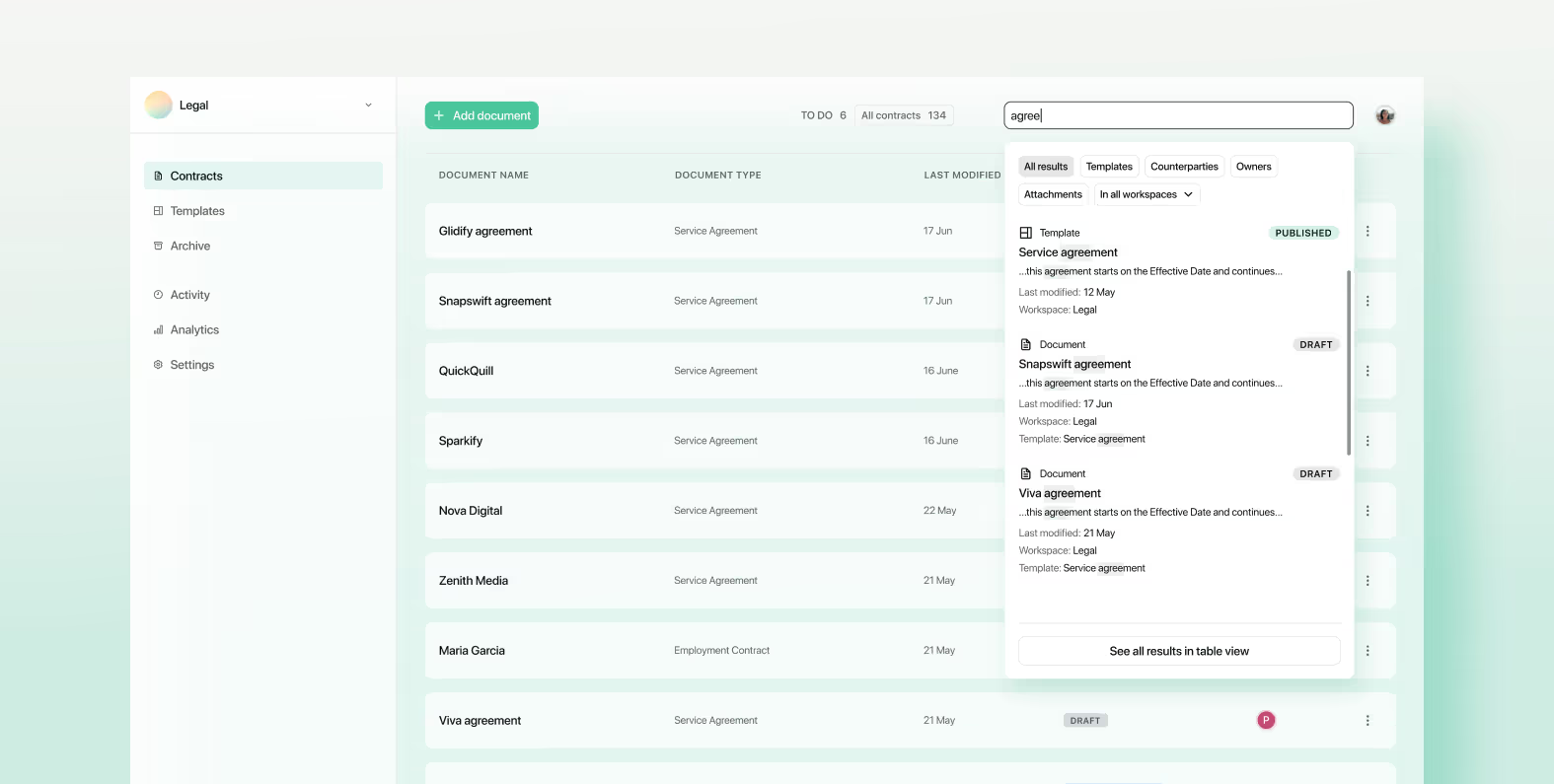Solutions
Customer Support
Resources
Download your free North Carolina lease agreement template and streamline your contract creation process.




Managing lease agreements is crucial for landlords, property managers, and tenants. A North Carolina lease agreement template can streamline this process, ensuring compliance with state laws and protecting the rights of all parties involved.
In this article, we'll delve into what a North Carolina lease agreement template is, the relevant laws, its purpose, management, use cases, management challenges, and how Juro can help manage these agreements efficiently.
A North Carolina Lease Agreement is a legally binding contract between a landlord and a tenant that outlines the terms and conditions for renting residential or commercial property in North Carolina. This agreement serves to protect the rights and responsibilities of both parties.
Several laws govern lease agreements in North Carolina, ensuring that the rights and obligations of both landlords and tenants are clearly defined. Key legal provisions include:

The purpose of a North Carolina lease agreement is to:
In North Carolina, lease agreements are typically managed by various stakeholders. These include landlords and property owners, who lease out their residential or commercial properties, and property management companies, hired by landlords to handle the day-to-day operations and management of rental properties.
Real estate agents might also be involved in drafting and managing lease agreements as part of their services.
While not managers of these agreements, tenants are responsible for adhering to the terms set out in the lease agreement.
These parties ensure that the lease terms are followed and handle any issues that arise during the rental period.

North Carolina lease agreements are used in the following situations:
Residential rentals: When individuals or families rent apartments, houses, or other residential properties.
Commercial rentals: For businesses leasing office spaces, retail stores, or other commercial properties.
Short-term rentals: For rental arrangements lasting less than a year, often for vacation homes or temporary housing.
Month-to-month rentals: For ongoing rental agreements without a fixed end date, typically renewed each month.
Subleasing: When a current tenant rents out the property to another individual for a specified period within the original lease term.
These agreements establish the terms and conditions of the rental relationship, ensuring clarity and legal compliance for both parties.
A North Carolina lease agreement template should include the following elements:

Including these elements helps ensure that the lease agreement is clear, comprehensive, and legally enforceable.
North Carolina lease agreements are usually managed through the following steps:
By following these steps, landlords and property managers can effectively manage lease agreements, ensuring a smooth and legally compliant rental experience for both parties.
Managing lease agreements can present several challenges, including:
Managing lease agreements can be significantly streamlined with the help of Juro's contract management software. Here’s a detailed look at how Juro can enhance your lease agreement management process:
Juro allows users to create automated contract templates, simplifying the process of generating lease agreements quickly and accurately. By filling out a few predefined fields, landlords can automatically populate the lease template with essential information such as tenant names, property details, rent amounts, and lease terms.
This automation reduces the risk of human errors and ensures all agreements are consistent and compliant with North Carolina state laws. The system also allows for easy updates to templates, ensuring that all new leases reflect any changes in legal requirements or company policies.
With Juro, customized approval workflows can be established to ensure that all necessary stakeholders review and approve lease agreements before they are finalized. This feature is particularly beneficial for property management teams that need to coordinate with multiple parties, such as property owners, legal advisors, and financial officers.
The approval workflow can be tailored to your specific needs, allowing for sequential or parallel approvals and incorporating automated notifications to keep the process moving efficiently.

For property managers handling multiple leases, Juro’s mass actions feature is a game-changer. It allows for the bulk signing and management of documents, which saves time and ensures that leases are executed promptly.
With a few clicks, you can send multiple lease agreements for electronic signatures, track their status, and manage renewals or terminations in bulk. This functionality is particularly useful during peak leasing seasons or when managing large property portfolios.
Juro provides a centralized, data-rich contract repository that offers instant visibility into all lease agreements. This repository allows you to track and monitor lease terms, renewal dates, rent payment histories, and other critical information. The advanced search and filter capabilities make it easy to locate specific contracts or extract data for reporting purposes. You can generate reports on various metrics, such as upcoming lease expirations or delinquent payments, helping you make informed management decisions.
Juro’s automated alerts and reminders ensure you stay on top of important lease dates. You can set up notifications for key milestones such as rent due dates, lease expirations, maintenance schedules, and inspection dates. These alerts help you manage your rental properties proactively, ensuring that critical deadlines are not missed and that you can address issues before they escalate.
Juro integrates seamlessly with a variety of real estate tools and Customer Relationship Management (CRM) systems, including Wise Agent CRM, Zillow, and Real Geeks. These integrations allow you to pull transaction data directly into your lease agreements, further streamlining the lease creation process. By connecting Juro with your existing systems, you can ensure that all your data is synchronized and that lease agreements reflect the most up-to-date information.
Juro’s AI-native contract automation platform empowers all teams to create, agree, execute and manage contracts up to 10x faster than traditional tools. To find out more, hit the button below to book your personalized demo.
Juro is the #1-rated contract platform globally for speed of implementation.


Juro embeds contracting in the tools business teams use every day, so they can agree and manage contracts end-to-end - while legal stays in control.
Book your demo